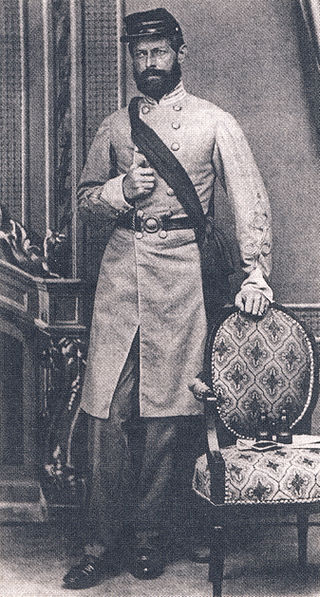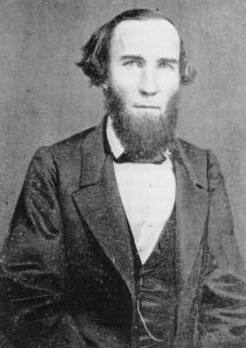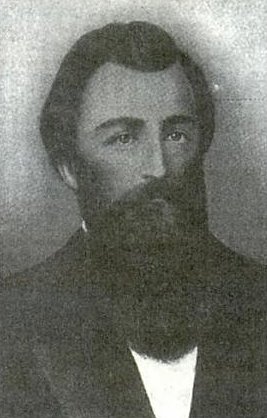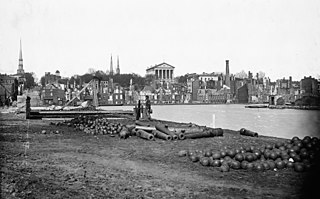
The Confederate States of America (CSA), commonly referred to as the Confederate States (C.S.), the Confederacy, or the South, was an unrecognized breakaway republic in the Southern United States that existed from February 8, 1861, to May 9, 1865. The Confederacy comprised eleven U.S. states that declared secession and warred against the United States during the American Civil War. The states were South Carolina, Mississippi, Florida, Alabama, Georgia, Louisiana, Texas, Virginia, Arkansas, Tennessee, and North Carolina.

Jefferson F. Davis was an American politician who served as the first and only president of the Confederate States of America from 1861 to 1865. He represented Mississippi in the United States Senate and the House of Representatives as a member of the Democratic Party before the American Civil War. He was the United States Secretary of War from 1853 to 1857.

Braxton Bragg was an American army officer during the Second Seminole War and Mexican–American War and Confederate general in the Confederate Army during the American Civil War, serving in the Western Theater. His most important role was as commander of the Army of Mississippi, later renamed the Army of Tennessee, from June 1862 until December 1863.

"John Brown's Body" is a United States marching song about the abolitionist John Brown. The song was popular in the Union during the American Civil War. The song arose out of the folk hymn tradition of the American camp meeting movement of the late 18th and early 19th century. According to an 1889 account, the original John Brown lyrics were a collective effort by a group of Union soldiers who were referring both to the famous John Brown and also, humorously, to a Sergeant John Brown of their own battalion. Various other authors have published additional verses or claimed credit for originating the John Brown lyrics and tune.

The Battle of Fort Sumter was the bombardment of Fort Sumter near Charleston, South Carolina by the South Carolina militia. It ended with its surrender by the United States Army, beginning the American Civil War.

Jefferson Columbus Davis was a regular officer of the United States Army during the American Civil War, known for the similarity of his name to that of Confederate President Jefferson Davis and for his killing of a superior officer in 1862.

John Milton was governor of Florida through most of the American Civil War. A lawyer who served in the Florida Legislature, he supported the secession of Florida from the Union and became governor in October 1861. In that post, he turned the state into a major supplier of food for the Confederacy. In his final message to the state legislature as the war was ending, he declared that death would be preferable to reunion with the North. When he killed himself, his son Jefferson Davis Milton was a toddler.

Henry Wirz was a Swiss-born American military officer and convicted war criminal who served in the Confederate States Army during the American Civil War.

LeRoy Pope Walker was the first Confederate States Secretary of War.

Castle Thunder, located between what is now 17th Street and 18th Street on northern side of E Cary Street in Richmond, Virginia, was a former tobacco warehouse, located on Tobacco Row, converted into a prison used by the Confederacy to house civilian prisoners, including captured Union spies, political prisoners and those charged with treason during the American Civil War. A large number of its inmates were sentenced to death. Even though the inmates were sometimes allowed boxes of medicine and other supplies, the prison guards had a reputation for brutality.

William Bruce Mumford was a North Carolinian native and resident of New Orleans, who tore down the U.S. flag raised over Confederate New Orleans after the city was captured by Union troops during the American Civil War. In response, Union Army Maj. Gen. Benjamin Butler, the commander of the Union ground forces, had Mumford court-martialed and executed for treason.

James Chesnut Jr. was an American lawyer and politician, and a Confederate functionary.

Henry Cornelius Burnett was an American politician who served as a Confederate States senator from Kentucky from 1862 to 1865. From 1855 to 1861, Burnett served four terms in the United States House of Representatives. A lawyer by profession, Burnett had held only one public office—circuit court clerk—before being elected to Congress. He represented Kentucky's 1st congressional district immediately prior to the Civil War. This district contained the entire Jackson Purchase region of the state, which was more sympathetic to the Confederate cause than any other area of Kentucky. Burnett promised the voters of his district that he would have President Abraham Lincoln arraigned for treason. Unionist newspaper editor George D. Prentice described Burnett as "a big, burly, loud-mouthed fellow who is forever raising points of order and objections, to embarrass the Republicans in the House".

Louisville in the American Civil War was a major stronghold of Union forces, which kept Kentucky firmly in the Union. It was the center of planning, supplies, recruiting and transportation for numerous campaigns, especially in the Western Theater. By the end of the war, Louisville had not been attacked once, although skirmishes and battles, including the battles of Perryville and Corydon, Indiana, took place nearby.

Richmond, Virginia served as the capital of the Confederate States of America during the American Civil War from May 8, 1861, hitherto the capital had been Montgomery, Alabama. Notwithstanding its political status, it was a vital source of weapons and supplies for the war effort, as well as the terminus of five railroads, and as such would have been defended by the Confederate States Army at all costs.

The Confederate States Secretary of War was a member of President Jefferson Davis's Cabinet during the American Civil War. The Secretary of War was head of the Confederate States Department of War. The position ended in May 1865 when the Confederacy crumbled during John C. Breckinridge's tenure of the office.

William Charles "Jack" Davis is an American historian who was a professor of history at Virginia Tech and the former director of programs at that school's Virginia Center for Civil War Studies. Specializing in the American Civil War, Davis has written more than 40 books on that subject and other aspects of early southern U.S. history, such as the Texas Revolution. He is the only three-time winner of the Jefferson Davis Prize for Confederate history and was awarded the Jules and Frances Landry Award for Southern History. His book Lone Star Rising has been called "the best one-volume history of the Texas revolution yet written".
The Jeff. Davis Legion was a cavalry regiment of the Confederate States Army. Made up of companies from Mississippi, Alabama, and Georgia; it fought primarily in the Eastern Theater of the American Civil War. In 1865, it was reassigned to the Army of Tennessee, surrendering at Greensboro, N.C.

Battery E, 1st U.S. Artillery was a United States Army field artillery battery that was in service between 1821 and 1901, most notably in extensive service with the Union Army during the American Civil War.























